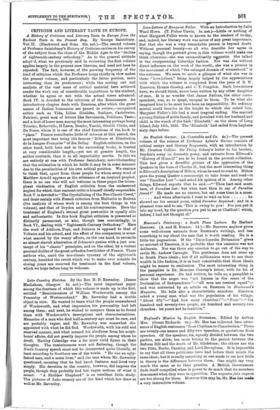Lake Country Sketches. By the Rev. H. D. Rawnsley. (James
MacLehose, Glasgow. 5s. net.)—The most important paper among the fourteen of which this volume is made up is the first, entitled "Reminiscences of William Wordsworth among the Peasantry of Westmoreland." Mr. Rawnsley had a double object in view. He wanted to learn what the people remembered of Wordsworth, and what impression his personality had left among them ; and next, he wished to compare them as he found them with Wordsworth's descriptions and characterisations. Memories of a man who died half-a-century ago must be rare, and are probably vague, and Mr. Rawnsley was somewhat dis- appointed with what he did find. Wordsworth, with his cold and reserved manner, and what seemed his aloofness from his neigh- bours' affairs, did not greatly impress the people among whom he dwelt. Hartley Coleridge was a far more vivid figure in their thoughts. The reminiscences were not flattering, though the North Country speech must not be interpreted quite literally, at least according to Southern use of the words. "He was an ugly- faheed man, and a mein liver," said one man whom Mr. Rawnsley questioned, meaning that he had harsh features and lived very simply. His devotion to the country, however, did impress the people, though they probably had but vague notions of what it meant. "A Skiddaw Shepherd" is an excellent little study. The pictures of Lake scenery are of the kind which few draw as well as Mr. Rawnsley. Love-Letters of Margaret Fuller. With an Introduction by Julia Ward Howe. (T. Fisher Unwin. 5s. net.)—Little or nothing of what Margaret Fuller wrote i8 blown to the readers of to-day, and, indeed, her literary work was never of any great importance. But that she was a very remarkable person is beyond doubt Without personal beauty—so all who describe her agree in saying, though the portrait given in this volume would make one think otherwise—she was extraordinarily magnetic. She talked in the overpowering Coleridge fashion. Nor was she without direct influence on the work of the world ; she was a pioneer in the movement of which "the enlarged domain of womanhood" is the outcome. We seem to catch a glimpse of what she was in these "love-letters," being largely helped by the appreciations with which the volume is completed from the pens of R. W. Emerson, Horace Greeley, and C. T. Congdon. Such love-letters have, we should think, never been written by any other daughter of man. It is no wonder that James Nathan, the other corre- spondent, was, so to speak, unequal to them. To be what she imagined him to be must have been an impossibility. No ordinary mortal could breathe in the height to which she raised him. Margaret Fuller's life had a most tragical ending. She married a young Italian of noble family, and perished with her husband and child in the wreck of the bark 'Elizabeth' on the shore of Long Island, July 15th, 1850. The 'Elizabeth' had sailed from Leghorn sixty days before.


























































 Previous page
Previous page